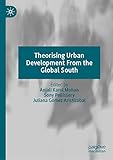Theorising urban development from the global south / edited by Anjali Karol Mohan, Sony Pellissery, Juliana Gómez Aristizábal.
Material type: TextPublisher: Cham, Switzerland : Palgrave Macmillan, an imprint of Springer Nature, [2021]Description: xxi, 287 p. : color ill. ; 22 cmContent type:
TextPublisher: Cham, Switzerland : Palgrave Macmillan, an imprint of Springer Nature, [2021]Description: xxi, 287 p. : color ill. ; 22 cmContent type: - text
- unmediated
- volume
- 9783030824747 (hbk.)
- 23 307.1216091814 THE 017953
| Item type | Current library | Call number | Status | Date due | Barcode |
|---|---|---|---|---|---|
 Book
Book
|
Indian Institute for Human Settlements, Bangalore | 307.1216091814 THE 017953 (Browse shelf(Opens below)) | Available | 017953 |
References-5 Urban Planning Practices in China: Struggling Between Politics and the Market-5.1 Introduction-5.2 Urban Planning as a Technical Process-5.2.1 The Evolution of China's Urban-Planning System-5.2.2 The Evolution of China's Urban-Planning Profession-5.3 Urban Planning and Politics-5.4 Urban Planning in the Socialist Market Economy-5.4.1 The Missing Public Spaces-5.4.2 Copycat Towns-5.4.3 Urban-Village Redevelopment-5.5 Conclusions-References-Part II The Heterogeneous South: Conflicting Rationalities.
Chapter 1. Introduction/A Critical Appreciation of Urban Trajectories in the Global South: Mutual Learning Opportunities (Anjali Karol Mohan, Juliana Gomez and Sony Pellissery) -- Part I: Emerging Planning Territories: Co-producing Spaces, Knowledge and Vocabularies -- Chapter 2. Addressing Metropolitan Governance through Suburban Space in an Ordinary City Region (Sarani Khatua) -- Chapter 3. Planning for the urban mosaic of a mega-city: the case of urban villages in Delhi (Banashree Banerjee) -- Chapter 4. Invisible territories: The visibility of an urban crisis in Medellin (Edwar A. Calderon) -- Chapter 5. A Tenure Security-Responsive Approach: The Case of Barrio Cantera, San Martin de los Andes, Argentina -- (Claudia Sakay, Silvia Aun, Akiko Okabe) -- Chapter 6. Informality, Everyday Practices, and Public Space (re)appropriation: The caseof El Cisne Dos, Guayaquil (Xavier Mendez Abad, Hans Leinfelder, Kris Scheerlinck) -- Part II: Planning Histories and Emerging Conflicts: Juxtaposition of the Traditional and the Modern -- Chapter 7. De-Colonising Gray Space: Bedouin-Arabs Resisting Metropolitan Displacement (Oren Yiftachel, Safa Abu Rabia, Erez Tzfadia) -- Chapter 8. Urban Planning and Rationality Conflicts in Malawi (Mtafu Manda) -- Chapter 9. Reimagining Urban Planning in a Tribal Region: Reflections from a Fifth Schedule Area of India (Aashish Khakha) -- Chapter 10. Religious Urbanism: Emergent Mixed-use Approaches to Planning and (re)development in Lagos, Nigeria (Taibat Lawanson) -- Chapter 11. New directions in spatial development in Southern Africa: Outlining the background, influences and significance of co-produced spatial production in Namibia (Guillermo Delgado) -- Chapter 12. Urban Planning Practices in Mainland China: Evolution and Paradigm Shifts (Zhi Liu) -- Chapter 13: Conclusions (Anjali Karol Mohan, Juliana Gomez and Sony Pellissery).
The book gathers debates from the Global South to offers fragments of the urban that provide clues to the larger, often-repeated ontological question that continues to hold: why and what does theory from the South mean? Deriving from and speaking to the simultaneously homogenous and heterogeneous South, the Chapters explore locally rooted knowledge systems, premised on social and cultural practices, as possible conduits to evolving planning methods and theory. Anjali Karol Mohan is an Urban and Regional Planning Faculty at the Institute of Public Policy, National Law School of India University, Bengaluru. Juliana Gomez Aristizabal is leading the Masters program in Urban and Environmental Processes at URBAM, EAFIT University, Medellin, Colombia. Sony Pellissery is Director, Institute of Public Policy, National Law School of India University, Bengaluru. Chapters [Chapter-1] and [Chapter-11] are available open access under a Creative Commons Attribution 4.0 International License via link.springer.com.


There are no comments on this title.